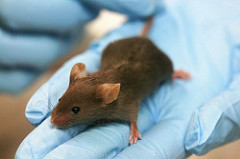We use animals for a lot of things, but they serve a particularly important function in research. However, of all the animals used in research, mice are used most frequently. This could be explained by the fact that human and mice genes are closely related and that the production of knockout mice is particularly useful for understanding the functions of individual genes. Mouse models have enabled us to learn a lot about the human body and how to fight certain diseases. A recent study involving mice has done just that by revealing a new possible treatment for brain diseases.
Image Source: Adam Gault
Researchers have genetically engineered mice that are capable of learning faster and being less fearful compared to regular mice. The researchers did so by altering a gene that caused inhibition of an enzyme known as phosphodiesterase-4B (PDE4B). When PDE4B, which can be found in the brain, was inhibited, the mice were able to carry out learning exercises more quickly and acted more courageously in situations which normal mice would deem dangerous. One particularly interesting test revealed that when PDE4B was inhibited, the mice were less likely to remember events that caused them fear, suggesting that PDE4B could be targeted for treating post-traumatic stress disorder (PTSD). In addition, the researchers believe that PDE4B may serve as a promising target for treating other brain disorders such as Alzheimer’s due to the enzyme’s involvement in memory development.
Although PDE4B is also present in humans, further research needs to be done in order to determine whether PDE4B plays the same role in humans as it does in mice. There are currently many incurable brain diseases that plague humanity. If inhibiting PDE4B is shown to produce the same results in humans as it does in mice, then we may have a way to deal with these unfortunate occurrences.
Feature Image Source: Lab Mouse by Global Panorama










